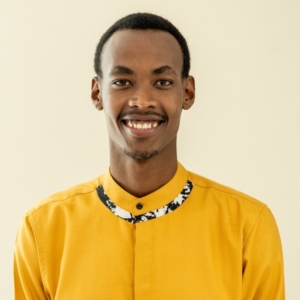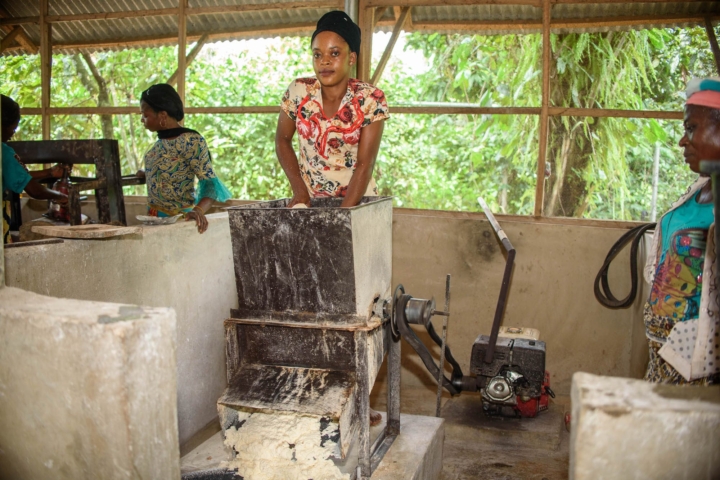Why language matters: embracing Kinyarwanda
by Elie Mandela
This article is an excerpt from the article “Could embracing Kinyarwanda unlock Rwanda’s youth innovation on massive scale?” published in The New Times. The full version can be found here.
The disconnect
Rwanda is a nation of 14 million people, more than 99% speak Kinyarwanda daily in all transactions, businesses, and functions. It is also estimated that more than 20 million people speak Kinyarwanda. This led me to ask myself, why is our education system’s language of instruction a foreign language that many, both teachers (less than 50% with the required English proficiency) and students, struggle to use or rarely use outside the confines of the classroom and in a few institutions across the country? While this might be a good alternative in multi-linguistic countries, this is not the case for Rwanda.
When starting out in school, I was always told that A is for an Apple. I could not fathom what an apple was, because I had never seen one until I was 15 years old. This is where the disconnect starts. Learning about sounds and objects that have nothing to do with your immediate environment and reality. To pass exams, you learn to cram these objects and sounds even when they mean nothing to you, and you don’t understand what they are.
Many rural families across Rwanda have been carrying out complex biological and chemical processes for centuries, however, their wisdom and our education system are divided by a language barrier. Because there are no words for “genes” or “chromosome” in Kinyarwanda, the lessons about genetics from school are not directly discussed at home, including how it relates to the breeding methods that Rwandans have been using and what can be improved based on what the student is learning. We are therefore not able to capture, harness, and improve on the knowledge of our ancestors, knowledge and ideas that have been passed on from generation to generation.
The consequences
It is obviously possible to translate this knowledge from English to Kinyarwanda or vice versa, but this creates an artificial barrier to the flow of information and ideas from the everyday interactions and environment that Rwandans are interacting with. It also adds a barrier to knowledge creation, excluding the ordinary Rwandan from intellectual contributions and discussions, because they occur mainly in a foreign language.
If being a skilled and excellent carpenter, plumber, electrician, coder, problem solver, or critical thinker does not need to be a good English speaker, then why can’t we have this knowledge transmitted in a language that is most accessible? What would it take to have a fully-fledged Polytechnique or University to entirely operate in Kinyarwanda? If not, why?
It is therefore not surprising that the top 30 countries ranked highly in the Global Innovation Index and Human Capital Index operate their education systems in their native languages. This includes small countries that are globally competitive and have small populations. Therefore, this removes the argument about the need for a foreign language because of our size and need to integrate into the global economy.
Unless we imagine that Rwanda will have English as its first language in the near future, we will continue to have crises within our education system because of a fundamental disconnect between the people’s everyday lives and the language of instruction of the system that is meant to nurture and develop them and society.
Importantly, with the advancement of Artificial Intelligence, mastering a foreign language will no longer be much of an advantage. Thus, ensuring that foundational knowledge is transmitted successfully and indigenous knowledge is leveraged and embedded in the country’s knowledge system, is critical for the future of Rwanda’s competitiveness.
What can be done?
Without a doubt, a language that does not grow dies. Therefore, creating a stronger backbone of Kinyarwanda documentation, that enables the creation of new words and ease of referencing for existing words is critical. A vivid example of this is a recent conversation on an online platform where people wanted to know what a tiger is called in Kinyarwanda. In the current state, there is no official reference for Kinyarwanda words and definitions. This needs to change to provide the foundation on which scientific knowledge in other languages can be built and updated as new words and technologies are created.
The consequences of keeping the current state are a price too high to pay, with the potential likelihood of Kinyarwanda going extinct within the next few generations.
As we work towards vision 2050 and beyond, it will be necessary that we build from a place of strength, our shared language and culture, to advance the well-being of our population and unlock the potential of the 90% currently left behind at the secondary and primary levels to be able to compete globally.
The irony is not lost on me that this article is in English. I am a product of 20 years of schooling entirely in English, and I struggle to write in Kinyarwanda. This confirms my fears that if nothing is done to revitalize Kinyarwanda and have it play a central role in our knowledge ecosystem, our language will slowly die from generation to generation, and so will our identity as a people.
About the author
Elie is a strong believer in the immense potential of the African continent, particularly its young people. Everything he has worked on over the last ten years, and aims to pursue in the coming years, focuses on enabling Africa’s young people to fulfill their potential and contribute to creating a more equitable and just world.

header photo credit: Resonate Workshops one of Azurit Foundation’s grantee partners in Rwanda, who conduct their activities in Kinyarwanda

